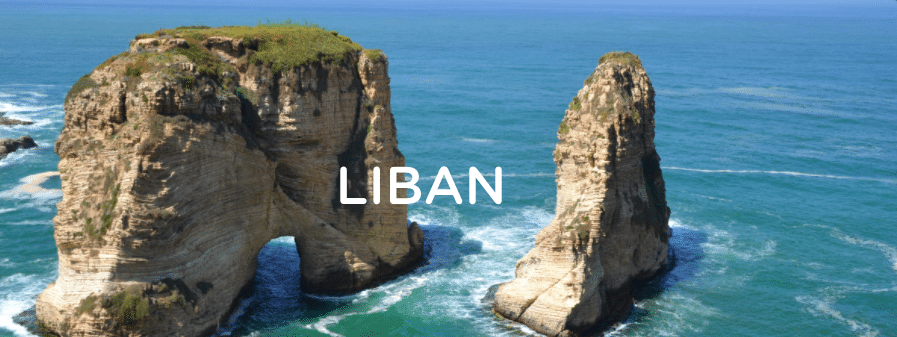|
| |
Le secrétaire général du Hezbollah a menacé les États-Unis d’un embrasement régional si ces derniers souhaitaient instaurer le chaos au Liban. Le chef du Hezbollah a appelé à un consensus national permettant l’élection d’un nouveau président de la République. La crise économique se stabilise dans le chaos en raison du système confessionnel libanais, de la dépendance de l’économie aux envois pécuniaires de la diaspora et au maintien par les puissances étrangères du pays loin de son point de rupture dans l'intérêt de leurs alliés. Saad Hariri, de passage au Liban, réaffirme sa position centrale sur l’échiquier politique sunnite malgré son retrait de la vie politique.
The Secretary General of Hezbollah threatened the United States with a regional conflagration if it wanted to create chaos in Lebanon. The Hezbollah leader also called for a national consensus to elect a new president of the Republic. The Lebanese economic crisis is moving away from historical standards and seems to be stabilising in chaos due to the Lebanese confessional system, the dependence of the Lebanese economy on remittances from the diaspora and the maintenance by foreign powers of the country far from its breaking point in the interest of their allies. Saad Hariri, visiting Lebanon, reaffirms his central position on the Sunni political scene despite his withdrawal from Lebanese politics.
|
|
|
|
| |
Info phare - Source médiatique |
|
|
|
| |
|
Le chef du Hezbollah met en garde les États-Unis
Dans un discours prononcé à l’occasion de la commémoration des « martyrs de la Résistance », le secrétaire général du Hezbollah a menacé les États-Unis et Israël. Le chef du Hezbollah a affirmé que si les États-Unis planifiaient d’instaurer le chaos pour aboutir à un effondrement du Liban, le parti n’hésiterait pas à user de ses armes pour porter atteinte aux intérêts régionaux des États-Unis. Poursuivant son discours en abordant la question du champ gazier de Karish et commentant les informations de presse attestant d’un début d'exploitation de la part d'Israël, le secrétaire général du Hezbollah a affirmé que si le gouvernement libanais retardait sciemment l’exploitation des champs pétroliers et gaziers présents sur le territoire libanais, le Hezbollah n’accepterait pas qu'Israël exploite le champ de Karish. Enfin, concernant l’élection présidentielle, le secrétaire général du Hezbollah a appelé à une entente interne qui mènerait à l’élection d’un nouveau président pour le pays, jugeant que la question était une question purement nationale.
|
|
Hezbollah leader warns US
In a speech on the occasion of the commemoration of the "martyrs of the Resistance", the Secretary General of Hezbollah threatened the United States and Israel. The Hezbollah leader said that if the United States planned to create chaos leading to the collapse of Lebanon, the party would not hesitate to use its weapons to harm the regional interests of the United States.
Continuing his speech by addressing the issue of the Karish gas field and commenting on press reports that Israel has started to exploit it, the Secretary General of Hezbollah said that if the Lebanese government knowingly delayed the exploitation of oil and gas fields on Lebanese territory, Hezbollah would not accept that Israel exploits the Karish field.
Finally, regarding the presidential election, Hezbollah's Secretary General called for an internal agreement that would lead to the election of a new president for the country, deeming the issue to be a purely national matter.
|
|
|
|
|
|
| |
|
La résilience négative du Liban
Annoncée comme l’une des pires crises économiques depuis plus d’un siècle et demi par le FMI, la crise économique que subit le Liban depuis plus de 4 ans ne semble pas suivre la trajectoire traditionnelle des crises économiques et avance au ralenti. Alors que des crises similaires avaient mené à l’application de thérapies de choc, comme en Grèce ou au Sri Lanka, le Gouvernement libanais ne semble pas prêt à s’engager sur le terrain des réformes demandées par le FMI malgré la situation. Pour certains observateurs, la capacité des dirigeants libanais à jouer la montre découlerait de plusieurs facteurs : le système confessionnel qui empêche tout potentiel essor d’un choix politique alternatif directement perçu comme une atteinte à l'intérêt confessionnel, la dépendance de l’économie aux envois de fonds de la diaspora qui contribue à soutenir un marché dollarisé malgré les dévaluations massives de la livre libanaise ; et le poids des puissances internationales et régionales qui maintiennent le pays loin de son point de rupture politique pour préserver leurs alliés.
|
|
Lebanon's negative resilience
Announced as one of the worst economic crises in more than a century and a half by the IMF, the economic crisis that Lebanon has been undergoing for more than 4 years does not seem to follow the traditional trajectory of economic crises and is moving forward in slow motion. While similar crises have led to the application of shock therapies, as in Greece or Sri Lanka, the Lebanese government does not seem ready to engage in the reforms requested by the IMF despite the situation of the country. For some observers, the capacity of the Lebanese leaders to play for time is due to several factors such as the confessional system that prevents any potential development of an alternative political choice directly perceived as an attack on confessional interests, the dependence of the economy on remittances from the diaspora that helps sustain a dollarised market despite the massive devaluations of the Lebanese pound, and finally the weight of international and regional powers that keep the country far from its political breaking point to preserve their allies.
|
|
|
|
|
|
| |
|
Le bref retour de Saad Hariri
De retour au Liban pour une visite courte dans le cadre des commémorations de l’assassinat de son père, Saad Hariri a une nouvelle fois prouvé sa place importante sur la scène politique sunnite, en dépit de sa mise à l’écart de la scène nationale par son allié historique saoudien et malgré son retrait de la vie politique libanaise. Il a rassemblé une foule nombreuse lors de son apparition publique. L’ex-Premier ministre a affirmé qu’il n’avait pas abandonné les siens, promettant de poursuivre le chemin aux côtés de ceux qui le soutiennent. Devant plusieurs journalistes, le leader sunnite a cependant indiqué que son retrait de la vie politique était toujours d’actualité, mais ne s’est pas privé de commenter la situation politique du pays. Dans une critique aux aspirants à sa succession et les conséquences de la multiplication des chapelles politiques au sein de la communauté sunnite, Saad Hariri a affirmé que tous ceux qui évoquent les droits de la communauté sunnite ne font que lui porter tort de manière irréversible.
|
|
The stealthy return of Saad Hariri
Back in Lebanon for a lightning visit to commemorate the assassination of his father, Saad Hariri once again proved his prominence on the Sunni political scene, despite his sidelining from the national scene by his historical Saudi ally and despite his withdrawal from Lebanese politics, by gathering a large crowd at his public appearance. In front of a large crowd, the former Prime Minister affirmed that although he left Lebanon, he did not abandon his people, promising to continue the path alongside those who support him. In front of several journalists, the Sunni leader however indicated that his withdrawal from politics was still relevant but did not hesitate to comment on the political situation in the country. In a criticism of the aspirants to his succession and the consequences of the multiplication of political factions within the Sunni community, Saad Hariri said that all those who talk about the rights of the Sunni community are only harming it irreversibly.
|
|
|
|
|
|
| |
|
Le patriarche Raï fait porter la responsabilité de la situation actuelle à l'ensemble des députés libanais
Dans le cadre de son homélie dominicale, le patriarche maronite Raï a affirmé que la responsabilité d’élire un nouveau président de la République n'incombait pas aux seules forces chrétiennes. Selon le prélat maronite, si le président doit obligatoirement être de confession maronite, son élection doit être le fruit d’un vote impliquant l’ensemble des députés nationaux, musulmans et chrétiens. Interpellant les responsables politiques, le patriarche maronite les a appelés à respecter leur devoir constitutionnel, à mettre en œuvre les réformes politiques et économiques demandées au niveau international et à cesser les ingérences dans le système judiciaire qui paralysent l'enquête sur l’explosion du port de Beyrouth.
|
|
Patriarch Rai blames all Lebanese MPs for the current situation
In his Sunday homily, the Maronite Patriarch Rai said that the responsibility of electing a new president of the Republic does not lie with the Christian forces alone.
According to the Maronite prelate, if the president must be of the Maronite faith, his or her election must be the result of a vote involving all national deputies, Muslims and Christians.
The Maronite Patriarch called on the political leaders to respect their constitutional duty, to implement the political and economic reforms requested at the international level and to stop interfering in the judicial system which is paralysing the investigation into the explosion in the port of Beirut.
|
|
|
|
|
|
| |
|
Sayyed Fadlallah appelle à trouver une solution politique rapide
En recevant l’ambassadeur britannique au Liban, Sayyed Fadlallah a appelé les dirigeants politiques libanais à parvenir à un accord global permettant de sortir le pays et le peuple libanais de sa situation actuelle. Sayyed Fadlallah a exprimé ses craintes concernant le chaos qui pourrait atteindre le Liban en cas de manifestations incontrôlées faute de solutions apportées aux multiples crises que traverse le pays.
|
|
Sayyed Fadlallah calls for a rapid political solution
During his reception of the British ambassador in Lebanon, Sayyed Fadlallah called on the Lebanese political leaders to reach a comprehensive agreement that would allow the country and the Lebanese people to get out of their current situation. Sayyed Fadlallah also expressed his fears about the chaos that could reach Lebanon in case of uncontrolled demonstrations if the multiple crises that the country has been going through for more than 4 years are not resolved.
خلال استقباله للسفير البريطاني في لبنان أكد السيد فضل الله أن «لبنان بات بأمس الحاجة الى إنجاز تسوية تقود إلى حلول واقعية وتُخرج الناس من هذه الأزمة الكبرى التي يعيشونها»، وبالتالي على الذين يملكون القرار السياسي في لبنان أن يتواضعوا قبل أن تخرج الناس عن طورها»، مبدياً خشيته من «أن الأمور عندما تصل إلى الشارع وتعم الفوضى وقد تسقط الكثير من الضوابط ويصبح البلد مهتزاً في أمنه وأمانه وليس في اقتصاده ومعيشته فحسب».
|
|
|
|
|
|
| |
This newsletter is written by Pharos Observatory, an observatory of cultural and religious pluralism, as part of its assessment study of religious pluralism in the Near and Middle East. It gathers information, analyses and speeches which may not reflect Pharos Observatory's feeling about the situation, but which should be taken into account as part of the analysis. All recipients, who are Pharos Observatory partners, are encouraged to contribute to this Watch by sharing any information that is worthwhile and fit to print. Ce bulletin de veille est réalisé par l’Observatoire Pharos, observatoire du pluralisme des cultures et des religions, dans le cadre de sa mission d’étude de la situation du pluralisme au Proche et au Moyen-Orient. Il rassemble des informations, analyses et déclarations qui ne reflètent pas systématiquement la perception de la situation par l’Observatoire Pharos, mais qui constituent des documents à intégrer dans l’analyse. Les destinataires, partenaires de l’Observatoire Pharos, sont invités à contribuer à la qualité de cette veille par le partage de toutes informations utiles et diffusables.
|
|
|
|




